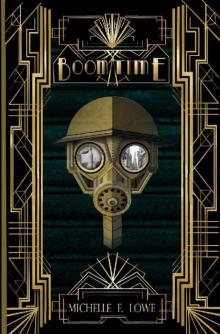- Home
- Michelle E Lowe
The Warning
The Warning Read online
THE WARNING
MICHELLE E. LOWE
This book is a work of fiction. Names, characters, places, and incidents are products of the author’s imagination or are used fictitiously. Any resemblance to actual events or locales or persons living or dead is entirely coincidental.
Copyright © 2012 by Michelle E. Lowe
All rights reserved by author, including the right to reproduce this book or portions thereof in any form whatsoever.
ISBN-13: 978-1463517724
ISBN-10: 1463517726.
Acknowledgements
I’d like to give thanks to everyone who has helped me push ahead.
To my friends who supported me; Alana Clarke, Amy Coughlin, Amber Hayman, Dawn Bannister Gold, Korri Knight, Lisa Karvelsson, Maya Taborsky, T.O Lawrence, and Taunji Hurlbut: Thanks for the moral support, guys.
I’d like to thank Kate Hallman for her support and editing.
Thanks to my parents, Jim and Janice, and my husband, Ben for their advice.
I give thanks that I have my daughters, Mia and Kirsten, who inspire me. Girls, mommy loves you.
Although he’s no longer here, I’d like to give thanks to my big brother, Jimmy. I know if he were with us today, he’d be the strongest member of my support team. Jimmy, I miss you.
Most of all, I’d like to thank my writing mentor, Catherine Rudy for making me a better writer and storyteller.
PROLOGUE
In his dream, he had a new life. In his dream, he became human.
Alpha Replica model 3007 woke to the piercing sound of an alarm. The dream-world around him dissolved by the time he opened his pale gray eyes and came fully awake. He was designed to wake from the deepest slumber at a snap of the fingers. Nineteen other Replicas rose from their beds and straightened the thin sheets. They slept in one large room with nothing more than a bed and a dresser apiece.
Once he tucked in his paper-thin sheet, Seven went to his dresser next to the bed. He pulled out a light gray shirt, white socks, undershirt, boxers, and gray pants. Several other identical and neatly folded outfits filled his dresser.
He pulled the shirt over his hairless chest and slipped his feet into a pair of black slippers. Like the others—all without any hair on their bodies, regardless of gender—Seven was as hairless as a beach ball.
Tall, muscular, and with kind eyes framed by a hard, chiseled face, he mimicked the exact features of the soldier he’d been copied from. He looked at his fellow Replicas and a warm but frightening feeling came over him. Since their return from the Iraqi War, they have never been parted. That would change by day’s end.
Once dressed, he joined the other Replicas standing beside their beds, hands clasped behind his back until the double doors slid open.
Each of them marched down the narrow hall, passing a room enclosed by glass. Inside, technicians studied different parts cloned from a human body. One of them had a pair of eyeballs on his desk with wires connecting the optic nerves to a computer. The eyes moved, looking at everything. Another had a severed arm clamped in an aluminum vise propped in an upright position. She shot tennis balls at it, testing its reflexes as it caught each ball.
In an adjacent room people studied bone density. One man bashed a skull against a rock, proving the bone was stronger when it left deep scratches on the stone. Seven was envious of that level of bone strength.
The hall opened into a large room where the Alphas walked over a catwalk. The Programming Room was where Replicas endured two stages of reconstruction applied to the four sections of their brain. Stripping the brain bare was the first stage; the second was infusing thought processes into it. After their so-called “birth”, they were injected with barbiturates to induce a coma before being put into storage for a year. After that year they’d reached adolescence, and were ready for the first stage of their programming. Once they grew into their physical prime—one year later—the second stage of programming began. The program included training on how to fight, track and use any type of machines and weaponry. Seven secretly referred to the programming as “mind rape”.
As they walked across the catwalk, he looked at the three fully developed clones lying on steel recliners thirty feet below with plugs penetrating their temples. They were the Betas, the next generation of Replicas.
Beside each Beta was a computer programming data into their heads. Seven remembered his day on that steel recliner, although he shouldn’t have. It would have been the equivalent of an infant remembering its emergence from the womb.
But he remembered it; he remembered being born. Seven knew he wasn’t alone in his independent thought. He’d learned over the years that nearly every Alpha had questions and dreams, yet they knew how dangerous it was to share them.
He’d once asked his creator, Doctor Linden, about it and it had almost caused his execution. He’d quickly turned the story around, saying he’d only wondered if it was possible to remember the programming process.
From that point on Seven kept his questions to himself, aware that if he asked anything again, he’d be lead down to the Pit where defective models were shot and shoved into industrial-sized furnaces to be incinerated.
He learned something else that day: how to lie. It wasn’t something Replicas were supposed to do.
In 2009, the President ordered that Replicas had to be kept on a tight leash. So on the first of each month, the Replicas were injected with a silver tracking chemical. The method was more effective than placing a tracking device somewhere under the skin where it could be excised.
Seven sat on a cold steel chair, waiting for the needle. With him sat Nine and Twenty. A technician approached from the side, holding the 25ml hypodermic. The needle itself was four inches long, and when it penetrated Seven’s arm, he screamed inside. The needle prick, though, felt the least painful; the burning serum that traveled through his veins like liquid fire tore into his nerves.
On the outside, he showed no emotion. Inside, though, he owned a treehouse with a sign reading No scientists allowed. In his mind, he lived and dreamt of a world other than this one.
The automatic doors slid apart and the founder of the Artificial Life Development walked in. “Good morning, Seven, Nine, Twenty.”
“Good morning, Doctor Linden,” they replied simultaneously.
Linden stood, stroking his neatly trimmed beard. “You three are part of my first triumph. You’ve served your country during wartime, but now your time has passed. We have newer models to take your place.” His voice was as cold as the steel in the room. “We’ve come a long way since the day you were created and we no longer have room for you now.”
Seven’s toes curled inside his slippers. None of them said anything. They only listened indifferently as if Linden were speaking to inanimate objects.
Linden went on. “This will be your last month. In November, each of you will be taken to the Pit for execution.”
Without another word, he left.
“I can’t believe he broke the news to them like that,” one of the technicians said. “He acted like he was talking to a toaster.”
“So? These things aren’t like us. They don’t have feelings. Don’t think because they look like a person that they share our emotions.”
Seven blinked.
The Alphas gathered in the yard where they could speak to one another freely, although discreetly.
“What are we going to do?” Ten asked. “They’ll kill us all.”
“Be quiet,” snapped Fourteen. “Don’t draw attention.”
Although safe in the yard, cameras still rolled and they could pick up any emotion not usually expressed by the Replicas. That would cause suspicion, which would lead to questioning, and not all Replicas possessed the ability to lie like Seven.
&
nbsp; “I think we should overpower them,” suggested Fifteen. “They’re nothing against our strength.”
“That wouldn’t be wise,” Seven warned. “They have the Betas to protect them now, and we don’t have their strength.”
“What do you suggest?” asked Six. “That we do nothing? That we allow them to take us to the Pit?”
“Certainly not. There’s a way to escape.”
“How?” Nine asked.
Seven had waited a lifetime for this moment.
“There is a matter that concerns us.” He told them about the secret he’d learned not long ago and what would be required to prevent it from happening.
“Why should we care?” Ten challenged. “Humans aren’t our responsibility.”
“I concur,” Thirteen spoke up. “If there is a way out, I think we should get as far away from this place as we can.”
Seven glared at her. “If you want to run, I can’t stop you.”
“How did you find this out?” Five asked.
“It’s not safe to discuss it now. When we regroup, I’ll tell you.”
“What’s your plan?” Eleven inquired.
“There’s a sewer drain just outside the north wall, large enough for us to fit through.”
“The north wall? That surrounds the yard where the fitness center is,” Twelve offered unhelpfully.
“Indeed.”
“How are we supposed to sneak over the wall without being noticed?”
“We can’t; it’s impossible,” Seven said grimly. “We’ll run.”
“Run?”
“Yes, we’ll run out of the gymnasium and not stop until we’ve jumped the wall. Once we’re on the other side, we’ll go into the sewer drain and disappear.”
“What about the tracking?” someone in the back posed. “We can’t wait until the end of the month for it to wear out.”
“We don’t wait,” Seven said. “We’ll burn it up with exertion and bleed what we can out.”
“We could die.”
True. In fact, he expected some of them would die. But the risk of injury didn’t concern him. He scanned each of their faces. This would be their first mission without human direction, and he wondered if they could handle it. “I’ll need those of you who survive to be there when I need you. Are you willing to stand by me?”
“When should we do this?” Eighteen asked. “Most of us are scheduled for execution before November.”
“Tonight.”
“Tonight?” Nine asked.
Seven nodded. “Yes.”
“I’m with you,” Nine said.
* * * * *
Dozens of closed-circuit television screens walled the inside of a circular room. Linden and a tall, slender African-American woman watched the Replicas.
“What do you think they’re talking about?” Doctor Waver asked nasally.
“About their execution, I imagine,” he replied.
“Do you think they’ll try to escape? Or maybe rebel?”
Linden shook his head. “No. They have no fear of death. They don’t even know what it is. Without that, there’s no need for them to panic. They’re programmed puppets, nothing more.”
David Linden was sixty-six and a scientist of stem-cell research. As a young man he wanted to create humans with ten times the amount of strength and speed of any natural born person. He built his own laboratory in the basement of his late father’s estate to work in private. If word had leaked about his project, he would have been the target of pro-life fanatics and arrested for federal crimes.
Linden left the monitoring room and went to his office. On his way, he thought about what he’d said to Loren Waver. He didn’t really believe it himself. He recalled what Seven had told him about remembering the day of his programming. It made Linden wonder if there was more to Seven and the other Alpha series than he first believed. If humanity was stored within the clones it would make them the perfect subjects for his experiment.
He entered his office, where he planned to spend the rest of the day with his work. He approached a small wall safe and punched a code into the keypad. The thick titanium door opened and he retrieved the only item inside. In its mirror-like surface, his reflection appeared through a spectrum of colors. This new programming disc would change everything.
Oh, Hagley, if only you were here to witness this.
Doctor Greg Hagley II had been his partner and friend. He’d been a reproductive cloning researcher, and together they’d worked on his project; a pair of geniuses with a God complex. When they’d first attempted cloning, Hagley had used a low-tech version called artificial embryo twining. The results had been disastrous.
Eight out of ten fetuses had been stillborn, the rest were disfigured and died shortly after birth. On their eleventh try, they’d brought their first healthy Replica into the world. Six years later, the FBI caught wind of their work. When the Feds discovered the extent of the cloning progress, they’d taken Hagley and him into custody.
Charged with Reckless Endangerment and fearing a long prison sentence, Hagley lied and said it had all been Linden’s idea. Since the experiments had been done in Linden’s home and he’d made notes of the progress, the majority of the blame fell on him. Hagley even testified against him in court.
The key evidence against them, however, was their only successful clone. After the trial, the government seized the clone and sent him to a lab for study.
Hagley had been sentenced to four years in prison but served only half of that, getting released early for good behavior. Linden wasn’t as fortunate. He was handed a ten-year sentence without parole. In his first year a visitor from Washington arrived, bringing a proposal from the President. Help them fight the war on terrorism by cloning soldiers. Do it and the government would restore his assets and issue a full pardon.
Linden accepted the offer without delay. He’d built a laboratory on the island of Mill Rock, a small piece of land on the East River, between Manhattan and Queens. There he could work with better equipment and a team of skilled researchers.
Soldiers were selected as cloning subjects. The clones that resulted were sent to war immediately after their programming.
Sending clone soldiers into the field was supposed to remain top secret, but somehow word leaked. The newly elected President had ordered the Replicas to return to the laboratory and never leave the island. Linden was prohibited from producing any more and had kept his word until years later.
Hagley remained in Linden’s thoughts. The sting of his betrayal still pinched his heart, but the two would never make amends. Hagley had committed suicide recently. His body had been found in his West Nyack home, suffering a self-inflected gunshot wound to the head.
“Did you tell them, Father?” came the voice of a young boy. “Like we talked about?”
Linden yelped. The boy had opened the door and entered the room like a wraith. Letting out a frustrated sigh, he placed the disc back into the vault and closed the door. “You need to knock before you enter a room. I’ve told you that.”
Tremors rocked his body when the boy—he’d cloned thirty-one years ago—came near him. Although he remained in the form of a child, Christos could twist his limbs like licorice if he wanted.
He’d donated his own stem cells for their eleventh attempt. On that time, Hagley had tried a higher level of artificial embryo twining. The results were a success. Christos was born as a healthy baby boy.
More than healthy, he possessed rapid healing abilities, thanks to a breakthrough stem-cell process that cured paralyzed rats. Christos was also given anabolic steroids to enhance muscle development. This resulted in increased strength, speed, and reflexes.
The child developed into everything Linden and Hagley had strove for, except for two problems. Their perfect child was still a child. Linden never intended to be a father; however, he’d raised the boy as his own.
The other problem was that Christos hadn’t been programmed to obey like the other Replicas. He possessed somet
hing dangerous—free will. Unable to tap into the child’s mind, Linden had taken the chance and injected him with a serum that slowed his growth after the government returned the boy to him. He’d hoped limiting the boy’s aging would lower the threat if he ever chose to rebel. A sharp-tempered teenager with super strength, experiencing hormonal imbalances, could be extremely dangerous.
“Did you tell them?” Christos asked again. “Did you tell them about the execution?”
Linden slid his hand off the smooth vault door and turned to the boy. With a deep sigh, he said, “Yes, Christos, they know. The plan is set.”
“The Alphas know they’re scheduled for execution? They all know?”
Christos possessed the sweet face Linden had had when he’d been a boy. Sometimes looking at him reminded Linden how easy it was to forget the child he’d outgrown. Disregarding such carefree memories could take away part of someone’s heart, allowing the harshness of adulthood to fill that void.
“Each and every one,” he assured, walking to his desk. “Now, I have work to do.”
Without another word, Christos left, shutting the door behind him. When he was gone, Linden released his pent-up breath.
In the evening, the Alphas went into the fitness center where custom-made exercise equipment filled the gymnasium. Tonight, they stood by a sliding glass door, which lead out to a running track. Beyond it was the north wall.
Glass shattered when Seven smashed a fist through the door. Shards dropped and Seven caught one. He jabbed it into his wrist and slashed halfway up his forearm. The sudden hot pain jolted all the way up to his skull. Others followed, cutting into arteries in their legs and arms. A mix of red and silver sprayed about the room.
A worker, monitoring the security screens, caught sight of them.
“Holy shit! What the hell are they doing?”

 Boom Time
Boom Time Spine Shivering Stories!
Spine Shivering Stories! Atlantic Pyramid
Atlantic Pyramid The Forgotten Story
The Forgotten Story The Underground
The Underground The Reunion
The Reunion The Payment
The Payment The Warning
The Warning Bounty Hunter
Bounty Hunter